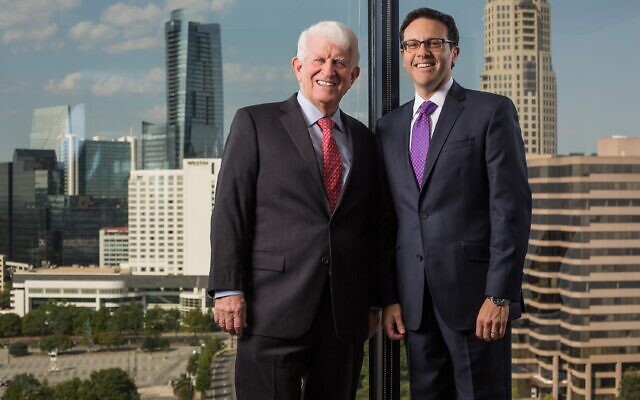Property Expert on Distress, Opportunity
Ron Glass expounds on the effects of COVID, on the future of retail, malls and rebounding.
After 37 years with the Atlanta Journal-Constitution and now with the AJT, , Jaffe’s focus is lifestyle, art, dining, fashion, and community events with emphasis on Jewish movers and shakers.

Atlantan Ron Glass has been active in all facets of the commercial real estate industry for over 45 years. He was the chief operating officer of Great American Management and Investment, Inc., followed by head of the dispositions for Equity Group Investments, where he worked closely with billionaire real estate mogul Sam Zell.
In 2001, Glass partnered with Ian Ratner to form GlassRatner Advisory & Capital Group, LLC, a national advisory firm, which, since 2008, has been involved in real estate and other transactions in excess of $6 billion. The firm was appointed as receiver for about 40,000 multifamily units and more than 5 million square feet of commercial space. In 2018, GlassRatner merged with B. Riley Financial, Inc. (NASDAQ: RILY), a diversified financial services company.
Tune into Glass’ recent observations:
AJT: What are some of the high-profile properties you have overseen?
Glass: The turnaround and sale of the Hyatt Grand Cypress, Clearwater, Fla.; The Ritz at Lake Oconee; the Elysian (now Waldorf Astoria) in Chicago. We are currently overseeing LakePoint Sports, the premier amateur sports facility in the country.
AJT: Has COVID affected what is in distress now?
Glass: It differs:
Hospitality: the business and leisure travel came to a halt. This industry has been the hardest hit.
Retail: With over 8.5 billion square feet of shopping centers, the U.S. has been “over-retailed” for years. Some retailers were struggling before COVID, in part due to e-commerce — the “Amazon Effect.” Retailers Sears, Toys R Us and others failed before COVID. The U.S. has too many malls in rural and suburban areas. The foreclosure of major malls like North Point and Town Center will continue. The good news is retail isn’t dead. Lenox Square and Phipps Plaza’s parking lots are full on weekends. Not everything can be shipped. Necessity retail uses, discounters, medical, health and wellness, pet services and grocers will all continue to do well.
It’s too soon to tell the long-term effect of COVID on the office sector. Multi-family has generally been stable. This sector might be a bit frothy. Industrial values and construction have increased. Single family has boomed during COVID, in part due to cheap debt.
AJT: How do you view the future of brick-and-mortar retail? You said that the growth in online sales in 2020 was not too significant considering that many retailers were closed during the pandemic.
Glass: Online sales increased by only 3.8 percent. Total retail sales were approximately $5 trillion; online sales represented $800 billion in 2020. Some form of traditional retail is here to stay.
AJT: Explain your favorite quote, “Don’t confuse genius with a bull market.”
Glass: Everyone is a genius during a growth market and low interest rates. It’s hard to make mistakes when the wind is at your back. Many investors don’t have the experience to properly underwrite the inherent risks. You can learn more about real estate investing during the market meltdowns than in the bull markets. When people are making money, hubris blinds their vision.
AJT: With the market uncertainty in retail real estate, you see an opportunity?
Glass: COVID, capital market disruptions and e-commerce are constantly evolving. These forces and risks create uncertainty, which will generate buying opportunities. When things are chaotic is the time to jump into the pool. Today is that time for retail investing.
B. Riley formed a joint venture with an Atlanta-based real estate firm Sullivan Wickley, experienced operators, fully integrated and nimble. We will pursue distressed, value-add, and core-plus strategy to acquire a diversified portfolio of shopping centers. We are investing over $7 million of our own capital to ensure an alignment of interests.
AJT: Is 2021 end enough time for the economic rebound?
Glass: No.
Retail sales jumped 9.8 percent in March. The world is not as healthy as the news portrays. Government stimulus has flooded the market with liquidity. Lenders offered forbearance to delinquent borrowers. This has propped up the market, but will eventually end. The increase in vaccinations and employment growth are signaling a “light at the end of the tunnel.” Retail sales should continue to rise. The recovery will be uneven, “a rising tide will not raise all ships.” Some retailers and shopping centers will come out of this crisis, others won’t.



comments